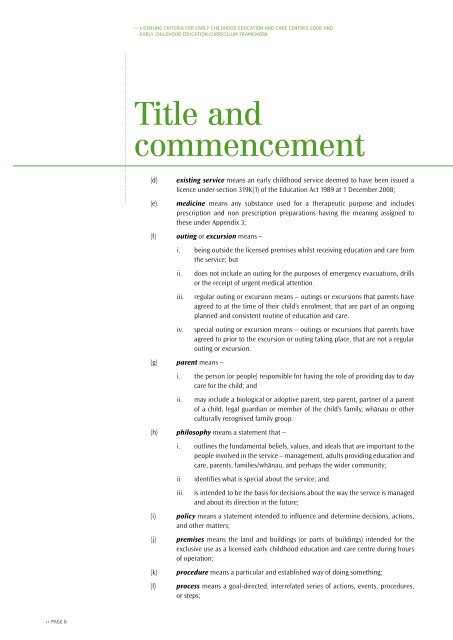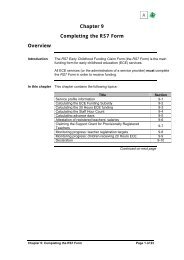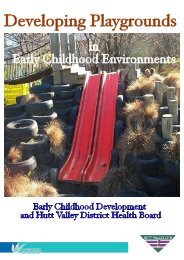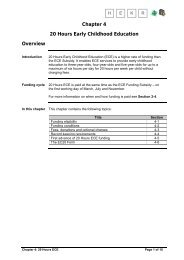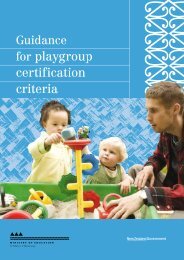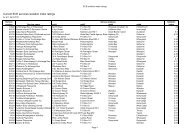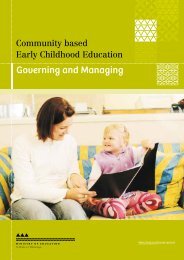Licensing Criteria for Early Childhood Education and Care Centres ...
Licensing Criteria for Early Childhood Education and Care Centres ...
Licensing Criteria for Early Childhood Education and Care Centres ...
You also want an ePaper? Increase the reach of your titles
YUMPU automatically turns print PDFs into web optimized ePapers that Google loves.
›› page 6<br />
›› <strong>Licensing</strong> criteria <strong>for</strong> earLy chiLdhood education <strong>and</strong> care centres 2008 <strong>and</strong><br />
earLy chiLdhood education curricuLuM fraMeWorK<br />
Title <strong>and</strong><br />
commencement<br />
(d) existing service means an early childhood service deemed to have been issued a<br />
licence under section 319K(1) of the <strong>Education</strong> Act 1989 at 1 December 2008;<br />
(e) medicine means any substance used <strong>for</strong> a therapeutic purpose <strong>and</strong> includes<br />
prescription <strong>and</strong> non prescription preparations having the meaning assigned to<br />
these under Appendix 3;<br />
(f) outing or excursion means –<br />
i. being outside the licensed premises whilst receiving education <strong>and</strong> care from<br />
the service; but<br />
ii. does not include an outing <strong>for</strong> the purposes of emergency evacuations, drills<br />
or the receipt of urgent medical attention.<br />
iii. regular outing or excursion means – outings or excursions that parents have<br />
agreed to at the time of their child’s enrolment, that are part of an ongoing<br />
planned <strong>and</strong> consistent routine of education <strong>and</strong> care.<br />
iv. special outing or excursion means – outings or excursions that parents have<br />
agreed to prior to the excursion or outing taking place, that are not a regular<br />
outing or excursion.<br />
(g) parent means –<br />
i. the person (or people) responsible <strong>for</strong> having the role of providing day to day<br />
care <strong>for</strong> the child; <strong>and</strong><br />
ii. may include a biological or adoptive parent, step parent, partner of a parent<br />
of a child, legal guardian or member of the child’s family, whänau or other<br />
culturally recognised family group.<br />
(h) philosophy means a statement that –<br />
i. outlines the fundamental beliefs, values, <strong>and</strong> ideals that are important to the<br />
people involved in the service – management, adults providing education <strong>and</strong><br />
care, parents, families/whänau, <strong>and</strong> perhaps the wider community;<br />
ii. identifies what is special about the service; <strong>and</strong><br />
iii. is intended to be the basis <strong>for</strong> decisions about the way the service is managed<br />
<strong>and</strong> about its direction in the future;<br />
(i) policy means a statement intended to influence <strong>and</strong> determine decisions, actions,<br />
<strong>and</strong> other matters;<br />
(j) premises means the l<strong>and</strong> <strong>and</strong> buildings (or parts of buildings) intended <strong>for</strong> the<br />
exclusive use as a licensed early childhood education <strong>and</strong> care centre during hours<br />
of operation;<br />
(k) procedure means a particular <strong>and</strong> established way of doing something;<br />
(l) process means a goal-directed, interrelated series of actions, events, procedures,<br />
or steps;


